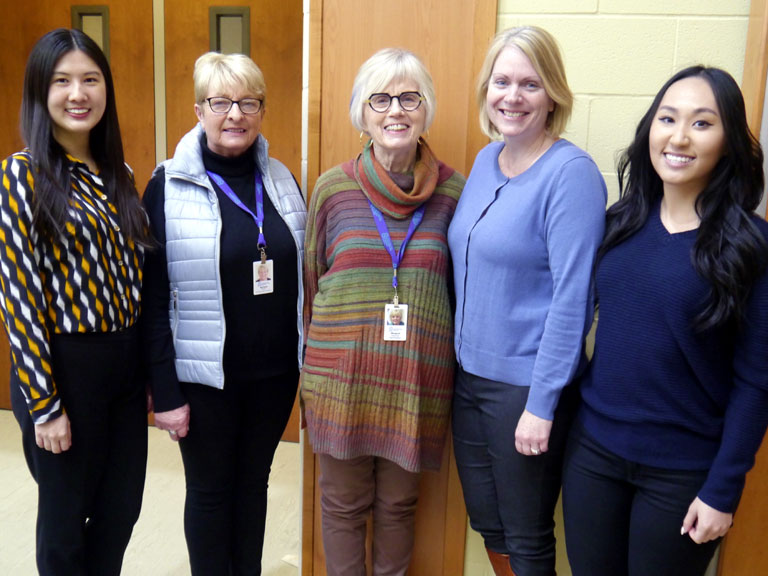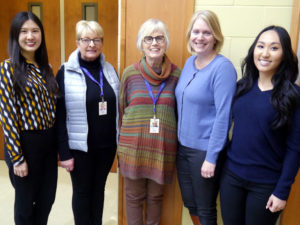County News
Elder abuse

Community Care for Seniors part of provincial research project
It is a difficult subject to tackle, yet the discussion is nonetheless an important one. It’s all about starting the conversation, and that conversation was initiated last Thursday at the Wellington and District Community Centre. An interactive and informative educational workshop, Turning Seniors Voices into Action: A Conversation about Elder Abuse, Mistreatment and Neglect, was presented by Laura McGugan and Margaret Werkhoven of The Prince Edward County Community Care for Seniors Association. The workshop saw around 25 participants, and forms part of a provincial research project being conducted by the National Initiative for the Care of the Elderly (NICE), which aims to train seniors to educate other community seniors about elder abuse.
Jessica Hsieh, NICE research manager, and colleague Sharon Tan, travelled from Toronto to oversee the workshop. “Our goal is to do 16 workshops across Ontario over a four-month period,” explained Hsieh. “Our first step is to get people talking about it and to raise awareness; it’s an important topic but there is so much stigma around it.” The conversation covered a number of areas, including the problems and prevalence of elder abuse, definitions of abuse, types of abuse, identifying risk factors and safety planning. “The rationale of the project is based on the national prevalence study of the mistreatment of older adults in Canada, which was conducted by NICE,” explained McGugan. It showed that the seniors interviewed reported they would more likely turn to their peers and friends if they were being abused, rather than to family members or medical professionals. McGugan said that often, those friends when approached, didn’t know what to do. “This is a great opportunity to learn the signs, learn reasons why people don’t necessarily report elder abuse or don’t want to get out of the situation. Hopefully, this will provide some understanding and information that if someone did approach you, you would know where to go.”

(L-R): Jessica Hsieh (NICE research manager); Barbara Proctor, Margaret Werkhoven and Laura McGugan (all with Community Care for Seniors); and Sharon Tan (NICE) were all part of the conversation on elder abuse.
The statistics are startling. The global prevalence of elder mistreatment is 15.7 per cent, or about one in six older adults (World Health Organization, 2018). In North America, the figures show two to 10 per cent of older adults experience elder abuse each year (Elder Abuse Ontario, 2018). In Ontario, it is believed between 40,000 and 200,000 seniors have either experienced elder abuse or are experiencing it right now. Prince Edward County has the second largest seniors’ population in Ontario. McGugan noted that by 2036, the number of seniors in Canada is expected to double in Ontario (Statistics Canada, 2018). “That means 24 per cent of the population will be over the age of 65, and from the last census, the seniors’ population for the first time was more than any other population,” she said. “We need to be able to take steps now to help prevent elder abuse, and help assist people who may be in this situation.”
Elder abuse does not discriminate. McGugan said it can happen regardless of culture, gender, race, financial status, or where you live, but Werkhoven noted certain groups, such as the LGBTQI2S community and immigrants were at higher risk. She noted that anyone can be an abuser, such as family members, friends, neighbours, caregivers or a health care provider, and it doesn’t have to be someone the person trusts, but often it is. “Generally, if you are married or in a relationship, it is the spouse or partner who is the abuser, then children and grandchildren: women are more often likely to be abused, and most often by a spouse,” said Werkhoven.
The definition of abuse is a single or repeated act, or lack of appropriate action within any relationship, where there is an expectation of trust, which causes harm or distress to an older person Werkhoven said. The types of abuse include physical, psychological, emotional, sexual, financial, and neglect, as well as spiritual and medication abuse. Physical abuse can be any action that causes bodily injury or physical discomfort, for example slapping, hitting, pinching, biting and choking. Indicators may include bruises, bites, burns, history of accidents, fractures and dehydration. “The definition of mistreatment includes abuse and neglect of older adults, and the definition of neglect means the basic necessities of care are not provided,” added Werkhoven.
Perhaps the most shocking statement that arose from the conversation was the lack of any requirement to report elder abuse. Further, there isn’t criminal law that specifically addresses the issue of elder abuse. “There is nothing in the Criminal Code of Canada that talks specifically about elder abuse; there are a number of sections where elder abuse is hinted at, but nothing specific,” said Werkhoven. “Newfoundland and Labrador is the only province that has a Neglected Adults Welfare Act,” she said.
“There is no law in Canada, except in Newfoundland,” confirmed Hsieh, adding, “The only place where you are required to report is in long-term care homes, and that’s only for professionals. Further, you are only allowed to report if you see someone else of your same profession abusing someone; if a nurse sees a social worker abusing someone, they have no duty to report that person.” Most people don’t know that, said McGugan. “That is maybe what we need to be advocating for, and pressuring politicians and asking why.”
Hsieh said they were excited to be reaching different populations, and to be going to different communities across the province meeting people they wouldn’t ordinarily get Hsieh said they were excited to be reaching different populations, and to be going to different communities across the province meeting people they wouldn’t ordinarily get
“I am just really thrilled at the amount of people we were able to reach today,” said McGugan. “After the workshop, many participants said they learned so much, so we’ve done what we set out to do and I’m really happy about that.” She said they hope to continue the workshops in different ways to ensure the information is out there and people know what’s happening. Community Care for Seniors can provide information and advice on elder abuse at 613.476.7493 or communitycareforseniors. org

Comments (0)